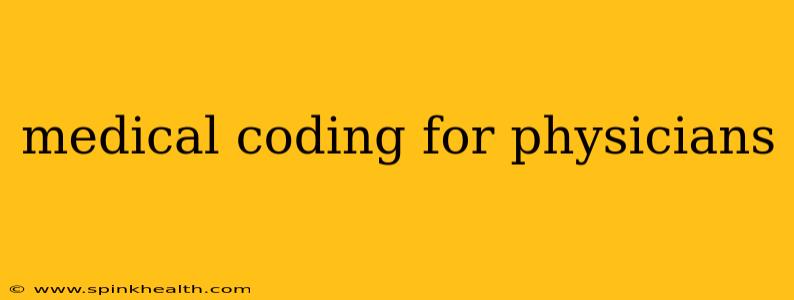Decoding the Mystery: A Physician's Guide to Medical Coding
The world of medical coding can feel like a labyrinthine maze to many physicians. It's a crucial aspect of healthcare, impacting everything from reimbursements to patient care, yet often remains a frustrating enigma. This isn't a guide to becoming a coder, but rather a deep dive into how understanding medical coding can empower physicians to navigate the complexities of their practice and improve patient outcomes. Imagine this as your personal Rosetta Stone for deciphering the language of medical billing.
Our story begins, not in a sterile office, but in the bustling examination room. Dr. Anya Sharma, a seasoned cardiologist, sighs, glancing at the ever-growing pile of paperwork on her desk. The day’s appointments are finished, but the administrative burden continues. She's frustrated, feeling like she spends more time grappling with codes than with patients. This isn't uncommon. Many physicians, passionate about patient care, find themselves overwhelmed by the intricacies of medical coding.
This article will explore the crucial role medical coding plays in a physician's practice and empower you to better understand this often-overlooked, yet critical, aspect of healthcare.
What is Medical Coding, and Why Should Physicians Care?
Medical coding is the process of transforming medical diagnoses, procedures, and services into standardized alphanumeric codes. These codes—primarily from the ICD (International Classification of Diseases) and CPT (Current Procedural Terminology) systems—are the language healthcare providers use to communicate with insurance companies and government agencies for billing and reimbursement. Think of it as the universal translator between the medical world and the financial world.
For physicians, understanding medical coding translates to:
- Accurate Reimbursement: Correct coding ensures you receive the appropriate payment for services rendered. Incorrect coding can lead to underpayment, delays, and even denials of claims.
- Improved Efficiency: A grasp of coding helps streamline billing processes, freeing up valuable time that can be better spent with patients.
- Compliance: Accurate coding is vital for complying with regulations and avoiding potential legal issues.
- Data-Driven Decision Making: Coding data provides valuable insights into the types of services provided, patient demographics, and overall practice performance.
What are the Different Types of Medical Codes?
This question touches upon the core of medical coding. There are several key types, each serving a distinct purpose:
-
ICD Codes (International Classification of Diseases): These codes classify diagnoses, symptoms, and other health conditions. The latest version, ICD-10-CM, uses alphanumeric codes to provide highly specific descriptions, leading to more accurate reimbursement.
-
CPT Codes (Current Procedural Terminology): These codes describe medical procedures and services performed by physicians and other healthcare providers. They provide a detailed account of the work done, impacting payment calculations.
-
HCPCS Codes (Healthcare Common Procedure Coding System): These codes supplement CPT codes, covering services and supplies not included in the CPT system. They often include items like durable medical equipment (DME).
How Can Physicians Improve their Medical Coding Accuracy?
Dr. Sharma, feeling overwhelmed, finally decides to take action. She begins by attending workshops, seeking guidance from billing specialists, and incorporating regular reviews of her coding practices. This is a crucial step. Accurate coding hinges on meticulous attention to detail. Here's how physicians can improve their accuracy:
- Invest in Training: Regular updates on coding changes are vital due to frequent revisions in coding systems.
- Utilize Coding Resources: Many online resources and coding manuals offer comprehensive guidance.
- Collaborate with Coders: Working closely with experienced medical coders can help prevent mistakes and ensure accuracy.
- Implement a Robust Charting System: Clear and detailed medical documentation is fundamental for accurate coding. The information needed for the correct code needs to be clearly stated in the medical record.
What are the Consequences of Incorrect Medical Coding?
Incorrect coding can have severe consequences:
- Financial Losses: Underpayment or denial of claims can significantly impact revenue.
- Audits and Penalties: Insurance companies and government agencies conduct audits, and incorrect coding can lead to fines or sanctions.
- Reputational Damage: Consistent coding errors can damage a physician's professional reputation.
The Future of Medical Coding for Physicians
The landscape of medical coding is continuously evolving. Technology is playing an increasingly prominent role, with electronic health records (EHRs) and advanced coding software aiming to improve accuracy and efficiency. However, the foundation still lies in a strong understanding of coding principles and a commitment to accurate documentation. Physicians who embrace this understanding will not only navigate the complexities of billing effectively but also ultimately enhance their focus on what truly matters—providing the best possible care for their patients. Dr. Sharma, now armed with a deeper understanding, finds her workload more manageable, her reimbursements more accurate, and her focus firmly where it belongs: on her patients.

